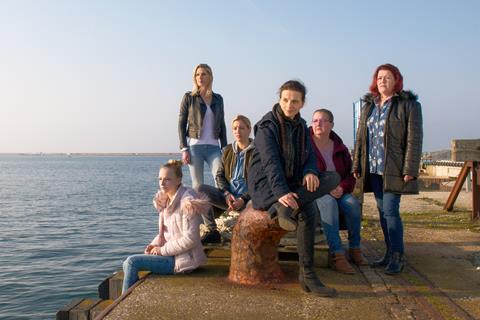Juliette Binoche stars in Directors’ Fortnight opener about an undercover writer who plans an expose on France’s employment crisis

Dir: Emmanuel Carrère. France. 2021. 117 mins
Marianne (Juliette Binoche), a successful writer, goes undercover as a contract cleaner in order to research her next book, an exposé of France’s employment crisis and the minimum wage treadmill. Documentary-style cinematography delivers the requisite gritty naturalism; the expected approach for films about economic inequality. And certainly, this picture ticks plenty of social realist boxes. But there’s a satisfying added depth born out of the persuasively fleshed out performances and the focus on female friendship. It’s particularly perceptive when it comes to the ethics of using real lives as material, and the question of the legitimacy of emotional bonds if one party is hiding essential truths about themselves.
Particularly perceptive when it comes to the ethics of using real lives as material
Loosely adapted from Florence Aubenas’ bestselling book, ’Le Quai de Ouistreham’, (translated into English as ’The Night Cleaner’) the film will draw comparisons to the breadline polemics of Ken Loach. But a closer parallel might be the humanism and camaraderie in the face of desperation explored in Stéphane Brizé’s The Measure Of A Man. Following on from its premiere in the opening slot of Directors’ Fortnight, the film should enjoy a healthy festival run. The combination of Binoche, the profile of the source material and the timely themes will likely draw audiences from beyond the festival circuit: the film has sold to several territories already and will be released in France by Memento Distribution.
Binoche is inarguably the star of the film, but there’s a generosity in her performance which allows the other, non-professional performers to claim their share of the story. Most notable of these is Hélène Lambert, who plays fiery single mother Christèle. From the moment that she storms into an unemployment office at the very start of the film, spitting with impatience at the bureaucratic fumbling which leaves her without the money to feed her kids, Lambert is mesmerising. Binoche is present in the scene too, but, like the rest of us, she is an observer, awed by the scalding intensity of Christèle’s vitriol. It’s a while before Christèle fully takes centre stage as a character, ultimately growing into Marianne’s closest friend on the demoralising slog of shiftwork cleaning cross-channel ferries. But even on the periphery of a scene, our eyes, along with the restless camera, are drawn to her, and to Lambert’s churning combination of anger and vulnerability.
None have quite the intensity of the bond that Marianne forms with Christèle, but there are other satisfyingly developed friendships. Cedric (Didier Pupin), an easygoing charmer, is rather smitten by Marianne and offers her a key moment of self-reflection when he admits to embarking on a relationship under false pretences. Suddenly, the ethical issues of a friendship built on lies click into focus and Marianne’s face clouds. But for the most part, she assumes that, because her feelings for Christèle and the other women are genuine and because her motives for writing the book are honourable, it shouldn’t matter that she hasn’t been entirely honest with them. “I can’t tell if all of this is right or wrong,” says an unemployment officer, the only person who recognises Marianne and who questions her motives.
The film rather lets Marianne off the hook for what is arguably a dubious ethical stance. But it raises an interesting question nonetheless: how true can any attempt, however well-meaning, be to shine a light on the plight of those on the poverty line when the artist is insulated by privilege? And where, exactly, is the line between inspiration and exploitation?
Production companies: Curiosa Films, Cinéfrance Studios, France 3 Cinéma
International sales: France Televisions Distribution renan.artukmac@francetv.fr
Producers: Emmanuel Carrère, Julien Deris, David Gauquié
Screenplay: Emmanuel Carrère, Hélène Devynck
Cinematography: Patrick Blossier
Editor: Albertine Lastera
Production design: Julia Lemaire
Music: Mathieu Lamboley
Main Cast: Juliette Binoche, Hélène Lambert, Didier Pupin, Emily Madeleine, Evelyne Porée, Léa Carne
























